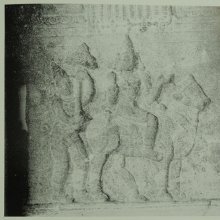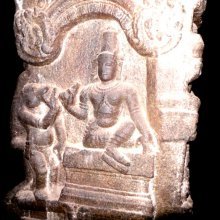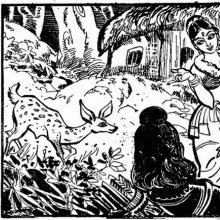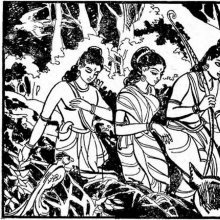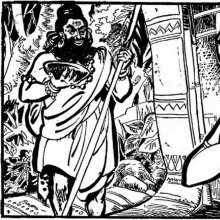Go: 32 definitions
Introduction:
Go means something in Buddhism, Pali, Hinduism, Sanskrit, the history of ancient India, Marathi, Hindi, biology. If you want to know the exact meaning, history, etymology or English translation of this term then check out the descriptions on this page. Add your comment or reference to a book if you want to contribute to this summary article.
Go has 30 English definitions available.
Images (photo gallery)
(+37 more images available)
Languages of India and abroad
Sanskrit dictionary
[Deutsch Wörterbuch]
Source: Cologne Digital Sanskrit Dictionaries: Böhtlingk and Roth Grosses Petersburger WörterbuchGo (गो):—
--- OR ---
Go (गो):—
4) [WEBER, Nakṣ. 2, 282.] —
9) [Rājataraṅgiṇī 5, 1.] [Spr. 2842] (zugleich Kuh). [Bhāgavatapurāṇa 11, 7, 50.] —
13) f. pl. [Bhāgavatapurāṇa 11, 7, 50.] —
15) [Spr. 2842.] Sinnesorgan überh. [Bhāgavatapurāṇa 7, 5, 30.] —
19) [Spr. 2373] (zugleich Kuh). —
23) a) gorāṅgirasasya sāma [Pañcaviṃśabrāhmaṇa 16, 7, 7.] gormāyūkasya [Weber’s Indische Studien 3, 459.] Zu [Mahābhārata 2, 381] vgl. [Rāmāyaṇa 7, 23, 28]; nach dem Comm. sind Go und Puṣkara balādhyakṣau der Söhne und Enkel Varuṇa’s. — b) [Oxforder Handschriften 39,b,43.] —
24) Bez. der Zahl neun [WEBER, Jyotiṣa 101. Nakṣ. 2, 382.]
--- OR ---
Go (गो):—
24) (Nachträge) [Sūryasiddhānta 1, 42. 2, 36. 3, 44.] wegen der neun Erden.
Source: Cologne Digital Sanskrit Dictionaries: Sanskrit-Wörterbuch in kürzerer FassungGo (गो):—1. —
1) m. Rind , Stier ; f. Kuh ; Pl. Rinder , Rinderheerden , Kühe. gavāmayaḥ und gavāmayanam eine best. Feier , gavāṃ medhaḥ Kuhopfer , gavāṃ vratas Name eines Sāman , gavaṃ tīrtham Nomen proprium eines Tīrtha. —
2) m. der Stier im Thierkreise. —
3) Kuhmilch , meist Pl. —
4) Pl. Fleischstücke vom Rinde. —
5) Rindshaut. — Leder , daraus geschnittene Riemen u.s.w. —
6) Sehne. —
7) ein best. Ekāha im Abhiplava. —
8) Pl. die Heerde am Himmel , die Gestirne. —
9) (*m. *f.) der Himmel. —
10) m. die Sonne in goputra 3). —
11) *m. der Mond. —
12) m. (*f.) Pl. Lichtstrahlen. —
13) ( der Sonnenstrahl Suṣumṇa. —
14) *m. f. Donnerkeil. —
15) *f. Weltgegend. —
16) f. = govīthī [VP.².2,276.] —
17) f. die milchende Kuh der Fürsten , die Erde. —
18) f. Bez. der Zahl neun. —
19) (*m.) f. Sg. und Pl. Wasser. —
20) Sinnesorgan. —
21) Auge. —
22) *m. f. das Haar auf dem Körper. —
23) *f. Mutter —
24) f. Rede , die Göttin der Rede. —
25) *m. Lobsänger. —
26) *m. Ross. —
27) Billion. —
28) *Beiname der Gaurī [Galano's Wörterbuch] —
29) Nomen proprium — a) m. verschiedener Ṛṣi. — b) f. verschiedener Frauen.
--- OR ---
Go (गो):—2. Adv. mit kar in eine Kuh umwandeln.
Sanskrit, also spelled संस्कृतम् (saṃskṛtam), is an ancient language of India commonly seen as the grandmother of the Indo-European language family (even English!). Closely allied with Prakrit and Pali, Sanskrit is more exhaustive in both grammar and terms and has the most extensive collection of literature in the world, greatly surpassing its sister-languages Greek and Latin.
See also (Relevant definitions)
Starts with (+3778): Garland of gold, Gavagra, Gavajana, Gavalika, Gavapasha, Gavargha, Gavarnas, Gavashir, Gavashira, Gavashva, Gavashviya, Gavasthi, Gavayurveda, Gavayus, Gavopasha, Gavrijika, Go bi da rap, Go bye, Go ca te, Go ita.
Ends with (+792): Abago, Abandonment of ego, Adatsigo, Adhanango, Adigo, Adugo, Adzago, African indigo, African mango, Agamago, Ago, Agogo, Agrostemma githago, Agumbogo, Ajonggo, Ala de murcielago, Aldrago, Aligango, Alisma plantago, Almacigo.
Full-text (+8138): Gopracara, Kep, Pesh, Dhrij, Ath, Gava, Triksh, Rev, Goka, Gorasa, Govish, Camb, Godhuli, Gosambhava, Govasha, Srek, Tarb, Ray, Vakh, May.
Relevant text
One of your search terms exceeds the minimun character amount per search term. This amount currently equals 2.
No search results for Go, Gō in any book or story.
Related products
(+18 more products available)
